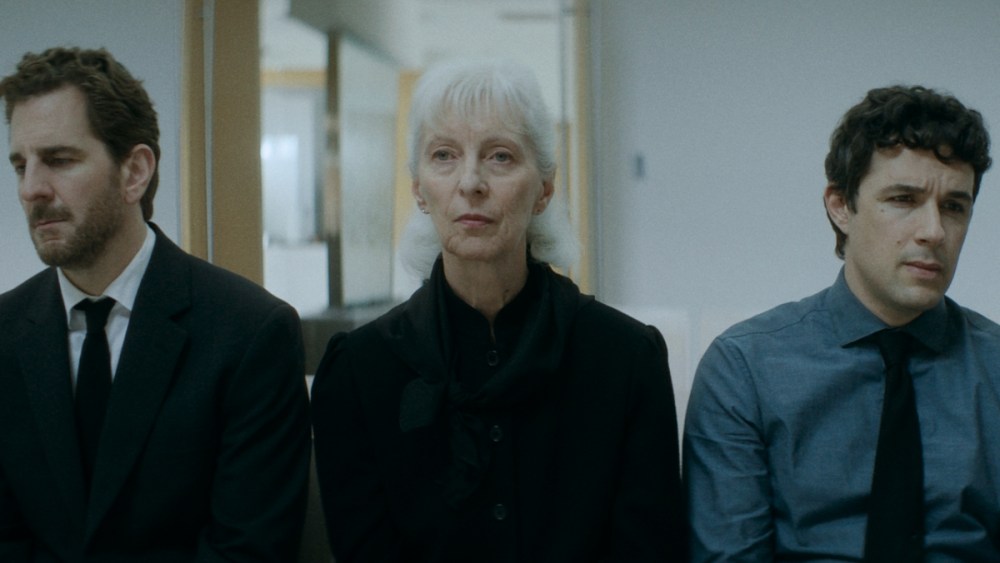Director Jesse Noah Klein is world premiering at Edinburgh the jet-black comedy thriller “Best Boy,” starring Caroline Dhavernas and Aaron Abrams, (“Hannibal”), Marc Bendavid (“Good Witch”) and Lise Roy (“Tom At The Farm”).
Set in Québec’s Eastern Townships, the film follows three adult siblings and their mother as they return to their long-dormant summer home. Years earlier, a strange family competition tore them apart; now, under the shadow of an absent patriarch, they are drawn back into a world of rules, rivalries and unspoken histories.
Klein’s third feature, “Best Boy” is produced by Laurent Allaire for Chasseurs Films alongside Band With Pictures and Mother and Son Films, and backed by Telefilm Canada and Sodec.
“I’ve seen firsthand how a male-dominated spirit of competition can erode home life,” Klein, the youngest of four, told Variety. “It is this fraternal tension, but also the fierce love in my own family that provided the seed from which this story grew. Through dark humour and literal life-or-death stakes, this film seeks to obliterate an antiquated familial model.”
Masculinity’s role in shaping the family dynamic is central. “The eldest brother keeps invoking their father with this intimacy, while another sibling is bordering on estrangement,” Klein said. “I wanted to take that spirit of competition to a heightened, almost ritualistic level. It’s exaggerated, but rooted in something recognisable — the subtle ways competition creeps in, even in adulthood.”
One of the most significant changes from early drafts was making the middle sibling, Philip, a woman. “She’s a biological woman who identifies as a woman, but her name is Philip, and she was never allowed to be a girl,” Klein explained. “Even her name denies the feminine. Each of the siblings is interacting with what they’ve inherited from the previous generation. I’m interested in what we take from our parents and grandparents, how it makes us who we are, and how it projects into the future.” It’s a powerful move, adding a simple strangeness to the competition by having the sister and daughter battle it out for the title of ‘Best Boy.’”
While Klein works primarily in English, he is firmly rooted in Québec’s bilingual film community, which benefits from national and regional funding. “Telefilm and Sodec are a privilege — there’s nothing like them in the U.S. It’s very competitive, but if you have something to say and can say it in a unique way, you should do it,” he said. “Québec has a rich ecosystem. There’s a lot of great filmmakers here, predominantly in French. As an Anglophone, I’m a minority within a minority, but I feel lucky to make films here. The crews are strong, and there’s a culture of ambitious, distinctive cinema.”
Shot in anamorphic by cinematographer Nicolas Canniccioni (“How to Have Sex”), “Best Boy” makes full use of its single location: we see a sprawling 1830s country house surrounded by forest and water, the interior is wood clad, broodingly quirky.
“It just towered over all the others we saw. The place had a strange power that fed into the story’s atmosphere,” Klein said. “The forest has an outsized influence — almost sacred to some characters, intimidating to others. Those kinds of landscapes can hold memories that feel larger than life.” At one moment the siblings battle in a lake, seeing who can hold their breath the longest; at another, they race on all fours through the grounds.
Rehearsals with the ensemble were extensive. “The more you prepare, the more you allow spontaneity,” Klein said. “We worked through the script line by line, changing dialogue where it made sense, even deciding which lines should be in French or English. By the time we got to set, the actors had made it their own.”
For Klein, “Best Boy” balances two creative impulses. “There’s the formal rigour of filmmakers like Yorgos Lanthimos and Athina Rachel Tsangari, and the emotional immediacy of American independent cinema,” he said. “I wanted to mine the emotional depth of intense human relationships, but also to keep the camera doing its own work. When is there intimacy, and when are we kept at a distance? That’s the tension at the heart of the film.”
“Best Boy” will be released in Québec by La Distributrice de Films, with Vortex Media handling Canadian distribution.
After Edinburgh, Klein will turn to his next project, “Glorious and Free,” which he described as “a bigger story on a larger stage” examining “how wealth and privilege can make you delusional.” For now, “Best Boy” competes for the Sean Connery Prize at the Edinburgh Film Festival, bringing together jet-black comedy, psychological tension and a portrait of family rivalry.

